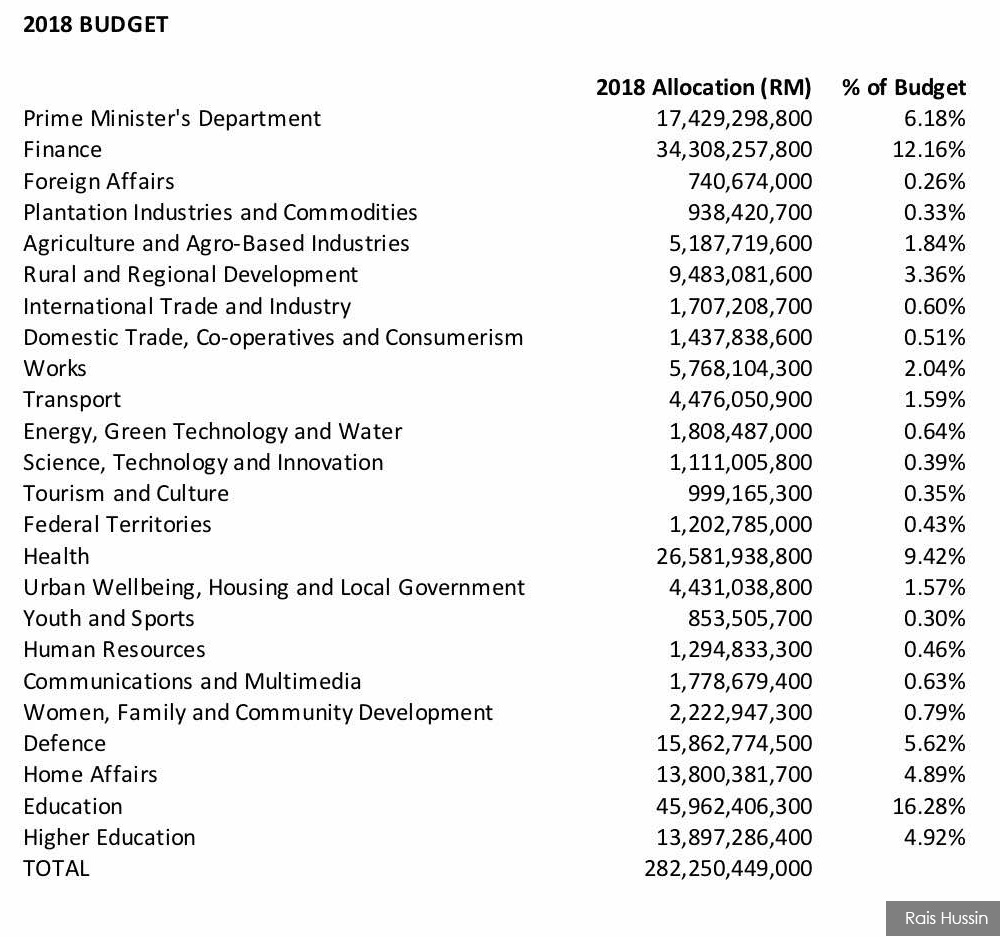COMMENT | Those who take Pakatan Harapan to task for not fulfilling all the pledges in 100 days, despite 21 out of 60 items being achieved, do not appreciate the difficulties of running a government on a proverbial empty tank.
They need to understand that there are 10 promises made in the first 100 days and 60 promises made in the first tenure of the Harapan administration.
Most who criticise it have yet to read the manifesto in full, and they cannot be expected to know or understand the content and the context.
When the coffers of the state were passed to Harapan – not with a national debt of RM687 billion, as BN kept insisting, but with debt and contingent liabilities that totalled more than RM1.09 trillion – Harapan had been given a dud treasury to run the next 100 miles.
When another RM19 billion could not be traced from the Goods and Service Tax (GST) collection, one could further deduce that the rakyat's hard-earned money had perhaps been pilfered completely. For the first time in history, a BN member of Parliament lodged a police report.
But as can be seen from the generic breakdown of the analysts below, each ministry has a thin, almost skeletal share of the proposed 2018 budget:

Still, the mangled budget has yet to show the true, decrepit picture. Debts, contingent liabilities, and the servicing of these debts are not reflected in the budget.
This is why Prime MInister Dr Mahathir Mohamad has warned, time and again, that Malaysia could have gone bankrupt had the spending and revenues remained grossly disproportionate in the years to come.
In financial terms, Malaysia has a twin current account and fiscal deficits. In the former, Malaysia imports more than it exports, and on the back of a weakened ringgit, too. Naturally, this adds to a faster monetary outflow.
In terms of government spending, Malaysia's annual deficit still hovers at 2.8 to three percent a year; though the present administration does intend to balance it by 2020.
When a country has a "twin deficits," it goes without saying that the financial speculators will start hovering over Malaysia to pounce on it, often by expecting the ringgit to fall further, or to short on it. The latter means betting that the ringgit will go down in value in the short, medium, even long term.
While 92 percent of Malaysian debts are denominated in ringgit, and not US dollar, the proverbial tent is pegged on unsafe ground, on which to participate in the international financial and economic system that is consistent with Industrial Revolution 4.0.

Take 4D printing, for example. In the future, a customer in a country driven by 4D economy, would be able to order a car online, allowing a 4D printing factory to assemble the car and send it to the consumer. Such technology is costly though convenient. Malaysia is way behind in this learning curve.
Thus, when too much ringgit is held in debt, rather than a mix of 60:40, the very weakness of the ringgit in any future or futuristic settings could lead to a financial meltdown. Alas, triggered by Malaysia's own backward circumstances in relation to the developed world that has raced ahead.
For instance, other currencies may strengthen, leaving the ringgit progressively diminished in value. Indeed, when foreign companies do try to operate in Malaysia, only a third- and fourth-tiered factory would be in the country.
Instead of earning ringgit to beef up their balance sheet, they would not be capable to do so. Thus denying them the capital to compete globally. So, they would focus on making Malaysia a cheap centre of manufacturing.
In a global survey of CEOs by Deloitte in 2017, Malaysia was ranked 17th and could potentially improve its position to become 16th in the world by the end of 2018. Which country is just a rank behind Malaysia?
The answer is Turkey. Faced with twin deficits, and a national debt that is largely denominated in fast maturing timeline this year, the Turkish lira has dropped by a whopping 64 percent since 2012.
Would Malaysia benefit from a US-China trade war?
Who, however, remains No 1 and No 2 in Deloitte’s research? China and the US. Now, if the two countries go into a full-fledged trade war by September 15, more Chinese factories could indeed relocate to Malaysia. Their aim would be to avoid any US quota, tariff restrictions and non-tariff barriers erected by the US.
But these relocations would be slow to occur. Essentially, giving Malaysia no immediate advantage and benefits in the short run.
When Malaysians expect the country to stick to every word and letter of the 100-day reform, it is a good sign that they expect reforms and consistency. Never in the history of past 13 general elections in Malaysia, has the manifesto been so discussed, tracked and debated as the last election.
This, in itself, shows that the people of Malaysia have been sufficiently sensitised to be involved in the participatory democracy with an intensity never seen before. The people and Harapan must be congratulated for such an admirable feat.
It is also important to note that Malaysia is a trading nation, one of the top 20 countries in the world. Malaysia's GDP is roughly US$314 billion dollars; compared to Singapore’s US$324 billion or Indonesia’s US$ 1.015 trillion. Thailand, which is in second place in Asean, has a GDP that is roughly US$455 billion.
Indonesia and Thailand have both tripled or doubled their populations between 1967 and 2017 Malaysia tripled its population but in a shorter time span: between 2004 to mid-2018. But Malaysia did not see a marked increase in productivity and wages under the administrations of Abdullah Ahmad Badawi and Najib Abdul Razak.
By sheer numbers alone, Malaysia appears to be the top five trading states in Asean, but our position hasn't changed much.
Our corporate lending rate is seven to eight percent, while other developed countries are operating within a range of two to three percent, making Malaysian loans one of the most expensive.
When our own ringgit dent is 92 percent, it doesn't herald a good thing when our corporate rate is that high. On top of which, our foreign reserves, while strong, are only enough to sustain imports up to a maximum of 7.7 months.
Although all the structural risks listed above were discovered post GE14, coupled with low commodities prices, it is amazing that Pakatan Harapan administration has managed to stick to its promise to repeal the Goods and Service Tax.
Choosing the right reforms
One must remember that the 100 days’ reforms, as attempted by Kang You Wei of China in 1898, opened a floodgate of criticisms that led to the downfall of Qing dynasty in 1911. Harapan must attempt all reforms with a great amount of prudence and care.
The 100 days’ reforms of US President Franklin D Roosevelt in 1933, however, produced a complete fillip. It led the US economy into the new post-World War II era.
All good things, however, did not last permanently. When the US government intervened too aggressively, the US economy began to stall. Stagnancy and inflation became an endemic feature of the United States in 1970s, roiled further by an energy crisis in the Middle East which inflated the price of oil in the US.
Thus, when President Ronald Reagan urged the US government to shrink the size of the government or public sector, the private sector in the US gained a new trajectory.
Even this ballast, admittedly, has led to two schools of economic thought, with one arguing that Reaganomics or trickle-down economics worked; while the other insisting that it didn't since the rich became richer while the poor became poorer in the US, hence, its growing income inequality.
Therefore, Malaysia has to choose the right 100-day reforms: Malaysia could either be staring at a precipice or the perch of greatness. Come what may, economic and institutional reforms are two of the most complex policy challenges.
Greatness is achievable by reinventing in areas like fintech, artificial intelligence, hydrocarbon cars, automation, robotics and the high-end manufacturing value chain that involves the use of 4D printing. The human capital in Malaysia has to undergo serious mental and intellectual revolution, too.
Barring such measures, Malaysia cannot go beyond strong 100-day reforms to achieve sweeping five-year reforms that can put it within a whisker of becoming a developed country consistent with the standards of the Organisation of Economic Cooperation and Development (OECD) of which Japan and South Korea are the only two Asian members.
Indeed, one would venture that the 'fulfilment of the manifesto' within the 100 days’ frame, while healthy must be understood within a larger canvas.
First, it suggests the dawn of the collective empowerment of the Malaysian voyeurs. Second, it can also become a hindrance to getting on with the core and strategic priorities since voters may not appreciate the rot Harapan has inherited. It is simply mind-blowing!
Consequently, the challenge isn't so much the point-by-point fulfilment of the 100 days manifesto per se – important as it is – but the fundamental return to honest and competent governance first, that can make Malaysia strong again.
Although the manifesto is a vital roadmap, one has to understand that the election was won on the back of universal disgust with corruption, too.
Obviously, anti-corruption efforts have to take the lead. The voters' wanted the wholesale rejection of BN, coupled with the broad desire for change.
Indeed, if the media is obsessed with the minutiae of whether Harapan has kept all its words, it is likely to misunderstand the difficulties that Harapan has to grapple with first.
Mahathir, despite his age, has a punishing schedule day in, day out. This is also true for the most of the ministers and deputy ministers in his cabinet, who work tirelessly, leaving no stones unturned to resuscitate and reinvent Malaysia.
When Malaysia can balance the books, overcome the twin deficits and increase the depth of its human capital, industrial revolution 4.0 is not merely within the sight of the country but an absolute certainty, given Malaysia's strategic geography.
Meanwhile, Selamat Hari Raya Aidil Adha, Maaf Zahir Batin.
RAIS HUSSIN is a Supreme Council Member of Parti Pribumi Bersatu Malaysia (Bersatu). He also heads the Policy and Strategy Bureau of Bersatu.
The views expressed here are those of the author/contributor and do not necessarily represent the views of Malaysiakini.

